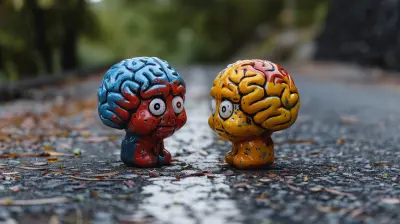The Psychology of Motivation and Procrastination
17 July 2025
Ever wonder why you can binge-watch an entire Netflix series but can't muster the energy to start that one task you've been putting off for weeks? You're not alone. Procrastination is something we’ve all wrestled with, often knowing exactly what we need to do but still choosing to do anything else instead. On the flip side, motivation can feel like fleeting magic — sometimes it's there, sometimes it's gone with the wind.
So, what's really going on in our brains? Why do we delay things that are important? And how can we hack our motivation to get stuff done without feeling like we’re dragging ourselves through mud?
Let’s dig deep into the psychology of motivation and procrastination — no fluff, just real, relatable insight.
What is Motivation, Really?
At its core, motivation is the energy or drive that pushes us to accomplish tasks, pursue goals, or simply take action. It’s what makes you get up in the morning, chase dreams, or even just check something off your to-do list.There are two main types of motivation:
- Intrinsic Motivation: Doing something because you enjoy it or find it meaningful. Think painting for fun or learning a new language because it fascinates you.
- Extrinsic Motivation: Doing something because of external rewards — money, praise, or even avoiding punishment. Like going to work because you get paid (not necessarily because you love the job).
Most of us juggle both types. But the balance between them deeply affects how driven we feel.
The Science Behind Why We Do (or Don’t Do) Things
Motivation doesn’t just magically arise. It’s actually influenced by a bunch of psychological and neurological processes. Here are a few key players:1. Dopamine – The Brain’s Cheerleader
You’ve probably heard of dopamine as the “feel-good hormone.” But here’s the kicker: dopamine isn’t just about pleasure — it’s about anticipation. When your brain senses a potential reward, it releases dopamine to nudge you into action.So why does this matter? Because if a task doesn’t trigger that anticipation of reward, your brain may decide it’s just not worth the effort. That’s when you reach for your phone instead of starting your taxes.
2. Executive Function – The Brain’s Planner
This is the region in your prefrontal cortex that helps with decision-making, goal-setting, and self-control. Think of it as the CEO of your brain. If it’s tired, overstressed, or overwhelmed, your ability to stay motivated takes a serious hit.3. Emotions – The Hidden Influencers
Feelings like fear, anxiety, or even perfectionism often stand between us and motivation. If starting a task makes you feel overwhelmed or like you might fail, your brain might say, “Nope, not today!”
Okay, So Why Do We Procrastinate?
Procrastination isn’t just laziness. In fact, most procrastinators are plenty busy — just not with the right things. It’s more of an emotional coping mechanism than anything else.Let’s break down the psychology of procrastination.
1. Task Aversion
We tend to procrastinate tasks that are boring, hard, or emotionally draining. It’s your brain's way of saying, “This looks painful — let’s avoid it."Ever opened your to-do list and thought, “Ugh, where do I even start?” That’s task aversion in action.
2. The Instant Gratification Monkey
In Tim Urban’s viral TED Talk, he introduces the idea of an “Instant Gratification Monkey” — the part of your brain that yells, “Let’s scroll Instagram instead!” when you're supposed to write a report.This monkey loves easy, fun, and dopamine-hit tasks. Unfortunately, those tasks rarely align with our long-term goals.
3. Fear of Failure (Or Even Fear of Success)
Sometimes we procrastinate because deep down, we fear the outcome. What if you finish the project and it's not good enough? What if people actually expect more from you in the future?So, we delay. Because not starting feels safer than starting and failing.
The Procrastination-Motivation Tug-of-War
Motivation and procrastination are often on opposite sides of the same rope, battling for control of your day. Here’s the twist — it’s not always about having more motivation, but about decreasing the resistance to starting.Ever noticed how once you start a dreaded task, it’s not as bad as you thought? That’s the magic of momentum.
Behavioral psychologist BJ Fogg calls it the “Tiny Habits” approach. Starting small — really small — can be the key. Like flossing just one tooth, or writing one sentence. Once you’re in motion, it’s way easier to keep going.
Motivation Myths That Hold You Back
Time to bust a few common myths that keep many of us stuck.Myth #1: “I Have to Feel Motivated to Start”
Nope. Motivation often shows up after you start. If you wait to feel inspired, you might be waiting forever. Action breeds motivation, not the other way around.Myth #2: “If I Procrastinate, I Must Be Lazy”
Not true. Procrastinators are often deep thinkers, perfectionists, or emotionally overwhelmed. Laziness implies a lack of desire altogether. Most procrastinators want to do the thing — they're just mentally blocked.Myth #3: “Deadlines Are the Only Fix”
Sure, deadlines work — to an extent. But relying solely on urgency leads to burnout. You don’t want to live in a constant state of stress, right?How to Actually Get Motivated and Stay That Way
Alright, let’s get practical. How do you turn good intentions into action?1. Break It Down
Big tasks feel scary. Break them into bite-sized chunks. Instead of “write report,” try “write intro paragraph” or “research for 15 minutes.” Little wins stack up.2. Set ‘If-Then’ Plans
These are like mental contracts. “If I finish breakfast, then I’ll study for 10 minutes.” It anchors your goal to your routine.3. Use Temptation Bundling
Pair something you love with something you avoid. Listen to your favorite podcast while cleaning. Watch your favorite series but only while exercising.4. Create a Visual Reward System
Use a sticker chart, habit tracker, or progress bar. Your brain loves visual proof of success.5. Master the 5-Minute Rule
Tell yourself, “I’ll work on this for just five minutes.” More often than not, you’ll keep going once you start. It’s a psychological trick that kills inertia.How Self-Compassion Plays a Role
Here’s a curveball: one of the best ways to beat procrastination is to stop beating yourself up about it.Research shows that people who forgive themselves for procrastinating are less likely to do it again. Self-criticism just adds to stress and avoidance. Compassion, on the other hand, reduces fear and increases the chance you’ll jump back in.
So if you slip up? Shrug it off, reassess, and keep it moving.
Motivation Isn’t Everything — Systems Matter
Even the most motivated people fail when they rely on willpower alone. That’s why routines, habits, and systems matter more than motivation.Set up your environment to make good choices easy. Want to practice guitar? Keep it out of the case and within reach. Want to write daily? Open your writing app every morning before checking emails.
Make motivation optional by making momentum inevitable.
Final Thoughts: You’re Not Broken — You’re Human
If you’ve ever thought, “Why can’t I just do the thing?” — give yourself a break. Motivation and procrastination aren’t character flaws. They’re natural parts of how our brains work.The key is to understand the patterns, recognize the triggers, and build small, sustainable habits that lead to big results over time.
Remember, progress beats perfection every single day.
all images in this post were generated using AI tools
Category:
PsychologyAuthor:

Eliana Burton
Discussion
rate this article
1 comments
Nixie McDougal
Take action, conquer procrastination!
August 3, 2025 at 2:59 AM

Eliana Burton
Absolutely! Taking small, consistent steps can break the cycle of procrastination and ignite your motivation. Start today!


